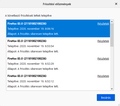
firefox keeps updating the same mar file
Hi,
I have made an update server following the article: https://firefox-source-docs.mozilla.org/taskcluster/setting-up-an-update-server.html The server works perfectly, my clients can see the update.xml and the mar file, but even after the client updates itself, it can not identify the update as the same and tries to update again and again...
My update xml is like this: <updates>
<update type="minor" displayVersion="83.0" appVersion="83.0" platformVersion="83.0" buildID="21181002100236">
Ŋuɖoɖo si wotia
Hi, It seems that the MAR file does not contains the build number directly. It contains the "application.ini", which holds this information. I have written a powershell script which can extract the file for me, 7zip can extract that ini file so I could parse it's content. As long this information stays in there, I'm happy.
The relevant part of this script:
$file = [System.IO.File]::ReadAllBytes($localfile) function Read-4bytes{ Param ( [int]$offset ) Process { return $file[$offset]*256*256*256+$file[$offset+1]*256*256+$file[$offset+2]*256+$file[$offset+3] } } $indexoffset = Read-4bytes(4) $indexsize = Read-4bytes($indexoffset) $remaining = $indexsize $pointer = $indexoffset + 4 while($remaining -gt 0){ $filename = "" $contentoffset = Read-4bytes($pointer) $contentsize = Read-4bytes($pointer+4) $flags = Read-4bytes($pointer+8) $pointer+=12 while($file[$pointer] -gt 0){ $filename += [char]$file[$pointer] $pointer++ $remaining-- } $pointer++ $remaining-=13 if($filename -eq "application.ini"){$remaining=0} } $content = @() for($i = 0; $i -lt $contentsize; $i++){ $content += $file[$contentoffset+$i] } $tempout = $localfolder + "temp.i" [System.IO.File]::WriteAllBytes($tempout, $content) $unzipfile = $localfolder + "temp" c:\tools\7z.exe e $tempout -o"$localfolder" $appini=Get-Content $unzipfile $buildID = ($appini -like "buildid*").split("=")[1] remove-item $tempout remove-item $unzipfile
It is not bulletproof, but works.
Xle ŋuɖoɖo sia le goya me 👍 0All Replies (3)
It seems that the xml content is not showing correctly, so I've attached a screenshot of it.
Hi, I could find out why it is keep updating itself. The buildID in the update.xml is much higher than in the real update file. If I can put the correct buildID in the xml, it stops the update cycle. Now my question - how could I get the correct buildID from the MAR file itself?
Ɖɔɖɔɖo si wotia
Hi, It seems that the MAR file does not contains the build number directly. It contains the "application.ini", which holds this information. I have written a powershell script which can extract the file for me, 7zip can extract that ini file so I could parse it's content. As long this information stays in there, I'm happy.
The relevant part of this script:
$file = [System.IO.File]::ReadAllBytes($localfile) function Read-4bytes{ Param ( [int]$offset ) Process { return $file[$offset]*256*256*256+$file[$offset+1]*256*256+$file[$offset+2]*256+$file[$offset+3] } } $indexoffset = Read-4bytes(4) $indexsize = Read-4bytes($indexoffset) $remaining = $indexsize $pointer = $indexoffset + 4 while($remaining -gt 0){ $filename = "" $contentoffset = Read-4bytes($pointer) $contentsize = Read-4bytes($pointer+4) $flags = Read-4bytes($pointer+8) $pointer+=12 while($file[$pointer] -gt 0){ $filename += [char]$file[$pointer] $pointer++ $remaining-- } $pointer++ $remaining-=13 if($filename -eq "application.ini"){$remaining=0} } $content = @() for($i = 0; $i -lt $contentsize; $i++){ $content += $file[$contentoffset+$i] } $tempout = $localfolder + "temp.i" [System.IO.File]::WriteAllBytes($tempout, $content) $unzipfile = $localfolder + "temp" c:\tools\7z.exe e $tempout -o"$localfolder" $appini=Get-Content $unzipfile $buildID = ($appini -like "buildid*").split("=")[1] remove-item $tempout remove-item $unzipfile
It is not bulletproof, but works.


